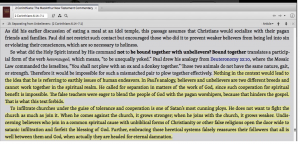I was translating John 9 last night before going to bed, and was struck by the following dialogue (super-functional translation warning):
The blind man said to Jesus, “Lord, I believe!” And he worshipped Jesus. Jesus said, “I came into this world for judgment, so that those who do not see may see, and so that those who see may become blind.” Some of the Pharisees who followed Him around heard what He said, and said to Him, “We are not blind as well, are we?” Jesus said to them, “If you were really blind, you would not be guilty of sin. But since you claim that you can see, your sin remains.”
Blind beggar, born blind for the purpose of this very encounter with Christ. Makes fools out of the religious elite by having common sense in seeing God’s hand in his own healing (was that not the unpardonable sin in Matthew: the twistedness of those who saw in the work of the Spirit the mark of Satan himself?). Is cast out for his troubles. Jesus seeks him out (Shepherd seeks the lost sheep—very next chapter!) Jesus identifies Himself, speaks of faith. The man believes and worships. What does his faith and worship produce? Jesus explains that He has come for a purpose, and it is not what you normally hear about during the 14th verse of Just As I Am. He has come for judgment, and the judgment involves sight. The blind are made to see, the seeing are made blind. Obviously, though He has healed a blind man, the action was metaphorical in the sense that it pointed to a greater reality: the physical healing pictured a spiritual reality (just as in John 11 and the raising of Lazarus!). The blind man could see what the Pharisees could not. They who thought they could see were, in reality, blind, and when Jesus says this, the little group of spies who followed Him around, trying to catch Him in His words, reporting to the big-wigs back in Jerusalem, knew He was talking about them, and so they ask Him bluntly if His words applied to them. He just as bluntly says yes: since they claim to see (and in fact do not), their sin abides or remains.
We need to be reminded, often, of the powerful Christ, the Christ who walks the pages of the gospels, but whose presence is often muted by our traditions and our fear of the faces of men. The Jesus of the Gospels tramples all over the canons of political correctness.



